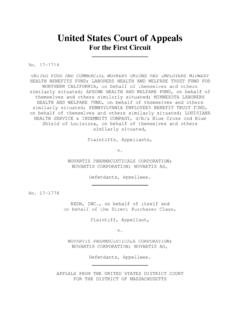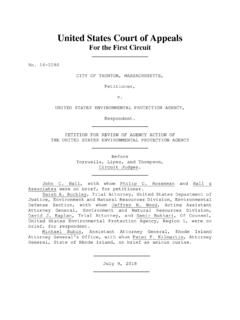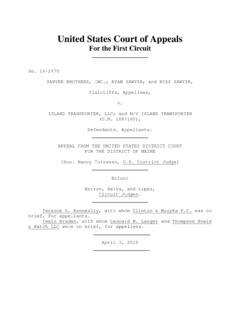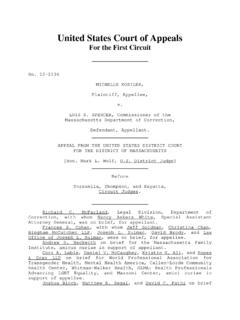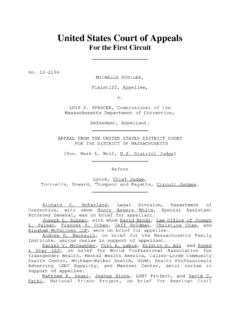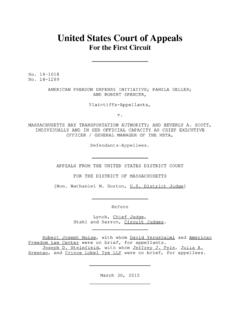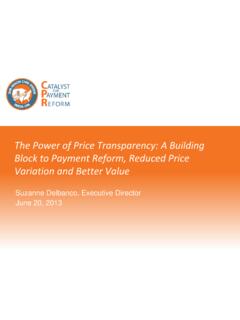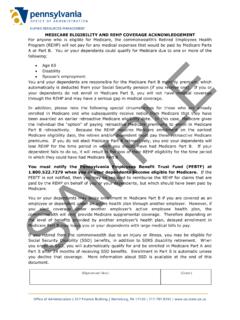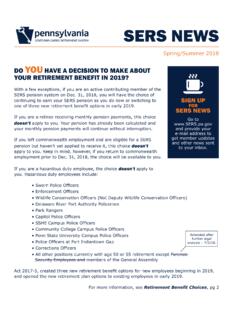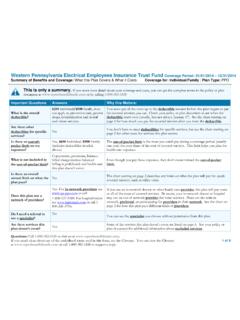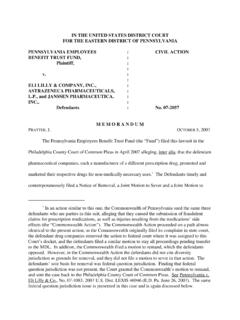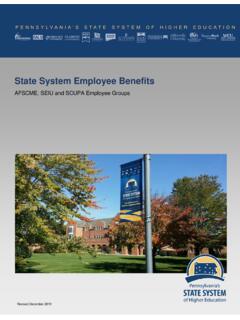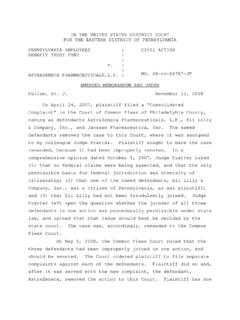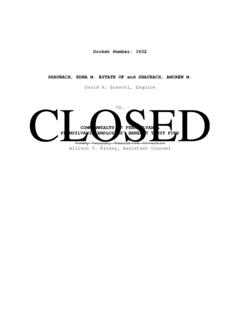Transcription of United States Court of Appeals
1 United States Court of Appeals For the First Circuit No. 18-1065 IN RE: ASACOL ANTITRUST LITIGATION United FOOD & COMMERCIAL WORKERS UNIONS AND EMPLOYERS MIDWEST HEALTH BENEFITS FUND, on behalf of itself and all others similarly situated; MARK ADORNEY, Plaintiffs, TEAMSTERS UNION 25 HEALTH SERVICES & INSURANCE PLAN, on behalf of themselves and all others similarly situated; NECA-IBEW WELFARE TRUST FUND, on behalf of themselves and all others similarly situated; WISCONSIN MASONS' HEALTH CARE FUND, on behalf of itself and all others similarly situated; MINNESOTA LABORERS HEALTH AND WELFARE FUND, on behalf of itself and all others similarly situated; AFSCME HEALTH AND WELFARE FUND; PENNSYLVANIA EMPLOYEES BENEFIT TRUST FUND; AHOLD , INC.
2 ; ROCHESTER DRUG CO-OPERATIVE, INC.; VALUE DRUG COMPANY; MEIJER, INC.; MEIJER DISTRIBUTION, INC., Plaintiffs, Appellees, v. WARNER CHILCOTT LIMITED; ALLERGAN, INC., f/k/a Actavis, PLC; ALLERGAN USA, INC.; ALLERGAN SALES, LLC; ALLERGAN, PLC, Formerly known as Actavis, PLC, Defendants, Appellants, ZYDUS PHARMACEUTICALS USA INC.; CADILA HEALTHCARE LIMITED; WARNER CHILCOTT (US), LLC; WARNER CHILCOTT SALES (US), LLC; WARNER CHILCOTT COMPANY, LLC, Defendants. APPEAL FROM THE United States DISTRICT Court FOR THE DISTRICT OF MASSACHUSETTS [Hon. Denise J. Casper, District Judge] Before Lynch, Kayatta, and Barron, Circuit Judges. J. Mark Gidley, with whom Peter J. Carney, Dana Foster, Matthew S.
3 Leddicotte, Jaclyn Phillips, Maxwell J. Hyman, Robert A. Milne, Jack E. Pace III, Bryan D. Gant, Kelly Newman, and White & Case LLP were on brief, for appellants. Richard A. Samp and Marc B. Robertson on brief for Washington Legal Foundation, amicus curiae. Justin N. Boley, with whom Kenneth A. Wexler, Tyler J. Story, Wexler Wallace LLP, Tyler W. Hudson, Eric D. Barton, David Barclay, Wagstaff & Cartmell, LLP, Nathaniel L. Orenstein, Todd A. Seaver, Berman Tabacco, Daniel E. Gustafson, Karla M. Gluek, Michelle J. Looby, Joshua J. Rissman, Gustafson Gluek PLLC, Jeffrey L. Kodroff, William G. Caldes, John A. Macoretta, Spector Roseman Kodroff & Willis, , Peter J. Mougey, Levin, Papantonio, Thomas, Mitchell, Rafferty & Proctor, , Jonathan D.
4 Karmel, and Karmel Law Firm were on brief, for appellees. October 15, 2018 - 3 - KAYATTA, Circuit Judge. Drug manufacturer Warner Chilcott Limited pulled one of its products -- Asacol -- from the market just months before the drug's patent protection expired. Warner simultaneously introduced a similar but not exactly identical substitute drug called Delzicol, the patent protection for which ran years longer. This coordinated withdrawal and entry of the two drugs allegedly precluded generic manufacturers from introducing a generic version of Asacol, which would have provided a lower-cost alternative to Warner's drugs Delzicol and Asacol HD, a version of Asacol that was also still under patent protection.
5 Crying foul, the named plaintiffs in this case filed a class action alleging a violation of the consumer protection and antitrust laws of twenty-five States and the District of Columbia. On plaintiffs' motion, the district Court certified a class of all Asacol purchasers who subsequently purchased Delzicol or Asacol HD in one of those twenty-six jurisdictions. In so doing, the Court found that approximately ten percent of the class had not suffered any injury attributable to defendants' allegedly anticompetitive behavior. Nevertheless, the district Court determined that those uninjured class members could be removed in a proceeding conducted by a claims administrator. We find this approach to certifying a class at odds with both Supreme Court precedent and the law of our circuit.
6 We therefore reverse. - 4 - I. Asacol is a pharmaceutical drug that treats mild to moderate ulcerative colitis, a chronic inflammatory bowel disorder. Developed and first manufactured by Procter and Gamble Pharmaceuticals, Asacol debuted on the market in 1992 and received the protection of two patents. Those patents expired on July 30, 2013. In 2008, Procter and Gamble brought a new variation of Asacol to market, dubbed Asacol HD, which treated moderate, but not mild, ulcerative colitis. This new drug differed from Asacol in two key ways: it included twice the dosage, and it replaced Asacol's single-layer coating with a dual-layer coating. Asacol HD's patent protection extended years beyond that of Asacol.
7 In 2009, Warner Chilcott purchased Procter and Gamble's pharmaceutical portfolio, which included both Asacol and Asacol HD. On March 18, 2013, only a few months shy of the end of Asacol's patent protection, Warner stopped selling and marketing Asacol. On the same day, Warner introduced a new drug: Delzicol. Delzicol, like Asacol, treats ulcerative colitis. The two drugs contain the same active ingredient and dosage, and sold for the same price. Unlike Asacol, Delzicol comes in a capsule that does not contain dibutyl phthalate ("DBP"). DBP is a plasticizer, the safety of which appears to have been the subject of a dialogue between the FDA and Asacol's manufacturers. - 5 - On June 22, 2015, several plaintiffs (collectively "plaintiffs," "named plaintiffs," or "class representatives") filed suit on their own behalf and on behalf of a putative class.
8 These plaintiffs are all union-sponsored benefit plans that paid for the purchases of Asacol HD and Delzicol. In their operative complaint, plaintiffs allege that Warner harbored an anticompetitive motivation for its conduct. According to the complaint, Warner's aim in pulling Asacol from the market and introducing Delzicol was to preclude the possibility of market entry of generic drugs, which would have cut into Warner's profits. State law provides the mechanism for this preclusion. Under most state substitution laws, pharmacists can fill a prescription by substituting a generic drug for the prescribed brand drug, but only if the brand drug is listed as a "reference" drug for the generic.
9 This automatic substitution, plaintiffs say, provides the "only viable cost-efficient means" for new generics to "compet[e] with brand drugs." But even a small alteration to the brand drug, such as substituting a tablet form for a capsule form, can prevent a generic equivalent from using the discontinued form as a reference drug. Thus, by pulling Asacol, Warner effectively prevented generic drugs that would have used Asacol as a reference drug from entering the market after the expiration of Asacol's - 6 - And the introduction of a similar, but not wholly equivalent, drug -- Delzicol -- with the potential for longer-lasting patent protection, allowed Warner to substantially retain its market share.
10 Thus, plaintiffs contend, Warner forced consumers into a "hard switch" and maintained its monopoly power unencumbered by competition from generic entry. Plaintiffs' theory of liability rests on a Second Circuit decision that condemns similar such conduct. See New York ex rel. Schneiderman v. Actavis PLC, 787 638 (2d Cir. 2015). The named plaintiffs and the putative class members purchased Warner's products not from Warner directly, but from third party intermediaries. That means that they cannot sue Warner for damages under the federal antitrust law. Illinois Brick Co. v. Illinois, 431 720, 736 (1977). Plaintiffs therefore seek recovery under the laws of twenty-five States and the District of Columbia that allow indirect purchasers to challenge anticompetitive conduct by manufacturers whose products consumers acquire through All twenty-six jurisdictions, 1 A number of our recent opinions provide comprehensive overviews of the regulatory framework that governs the introduction of generic drugs.
